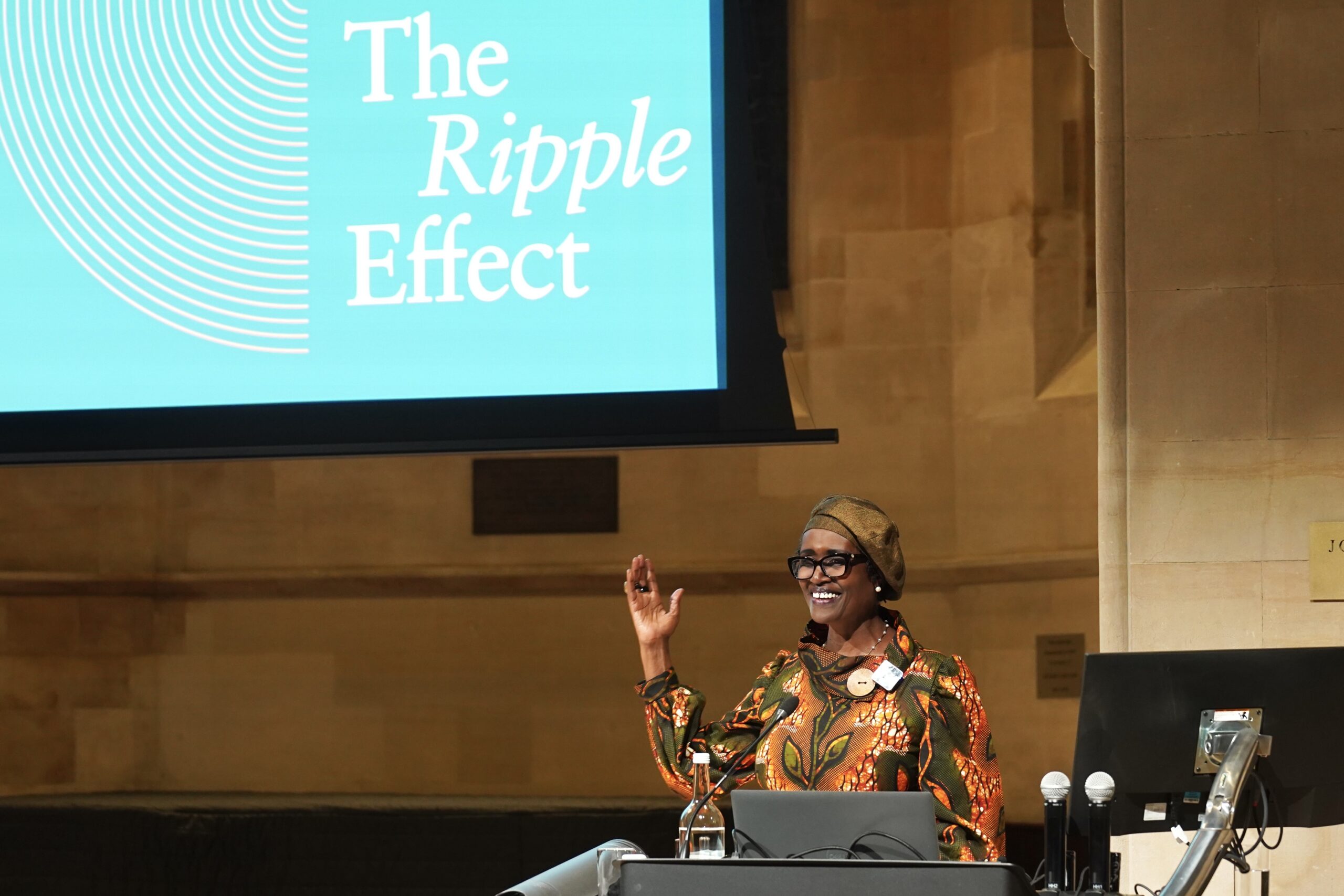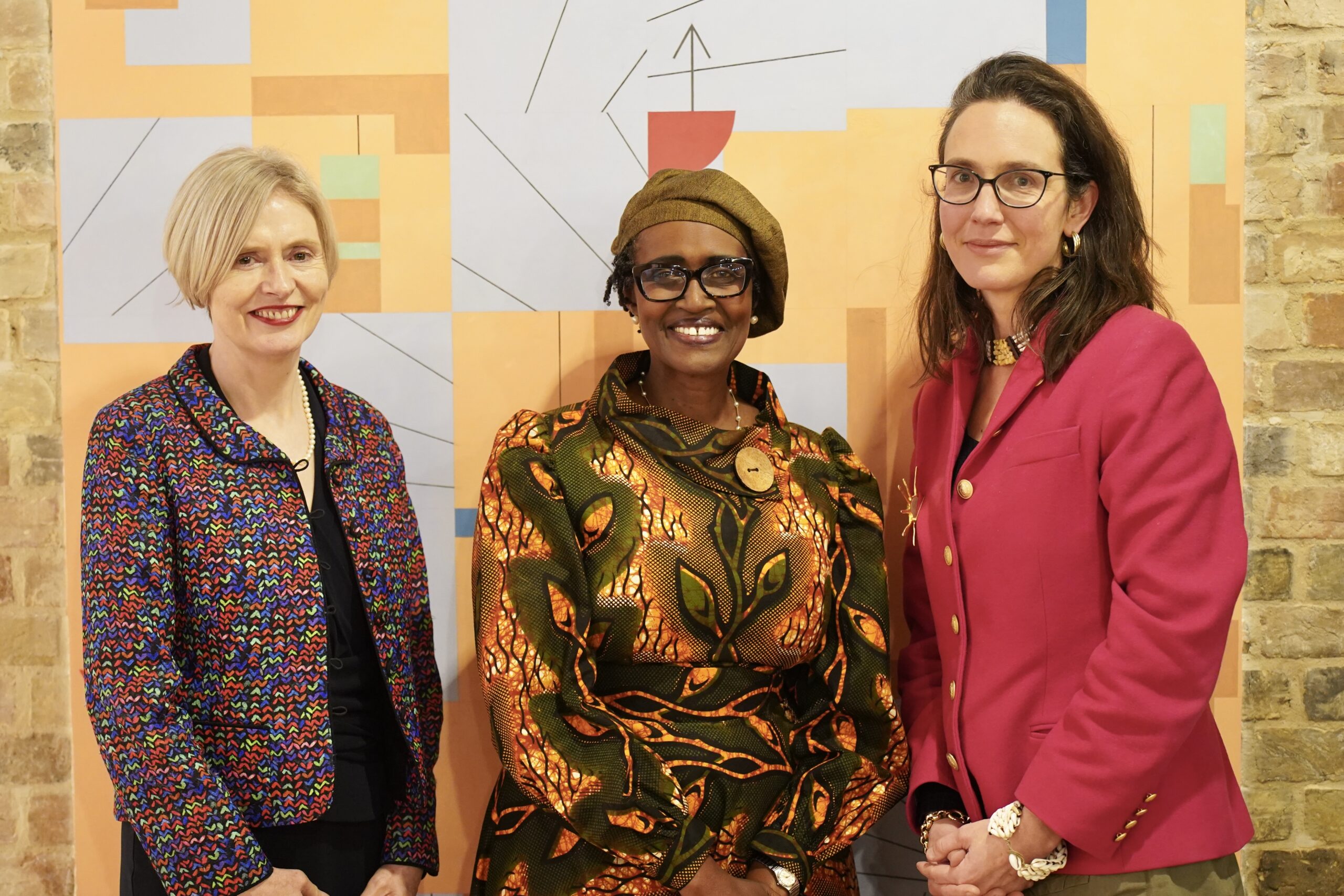
Winnie Byanyima, Chief Executive of UNAIDS, called for a development system that delivers health as a human right at the Gates Cambridge Annual Lecture
I hope that countries will not walk away. I hope they do not cave in to the oligarchy. But that they instead build something new – a development model that delivers health as a human right. Where multilateralism works to find global solutions to all global problems. That world is possible.
Winnie Byanyima
The US provides a third of global development assistance for fighting disease and preventing pandemics and three quarters of the global AIDS budget. Overnight that aid has been halted with devastating effects for the whole world, the head of UNAIDS said last night.
Giving the 2025 Gates Cambridge Annual Lecture at Pembroke College last night in celebration of Gates Cambridge’s 25th anniversary, Winnie Byanyima, Chief Executive of UNAIDS, outlined the huge threat to progress on fighting AIDS represented by the US cuts to development, as well as cuts by the UK and potentially others.
She said that already health clinics have shut, drugs for HIV and TB are lying locked in containers and childhood vaccinations and anti-malaria treatment have ground to a halt in many places.
 She added that if the US President’s Emergency Plan for AIDS Relief (PEPFAR), the world’s largest HIV health programme, stops aid permanently after a review period, UNAIDS estimates that by 2029 there will be an additional 6.3m Aids-related deaths per year, 3 million Aids-related orphans and 8.7m new infections in adults, compared to 1.3m new infections last year. She stated: “We would lose control of the AIDS pandemic. All the progress we have made over the last 25 years would be gone.”
She added that if the US President’s Emergency Plan for AIDS Relief (PEPFAR), the world’s largest HIV health programme, stops aid permanently after a review period, UNAIDS estimates that by 2029 there will be an additional 6.3m Aids-related deaths per year, 3 million Aids-related orphans and 8.7m new infections in adults, compared to 1.3m new infections last year. She stated: “We would lose control of the AIDS pandemic. All the progress we have made over the last 25 years would be gone.”
Byanyima said overreliance on one country had left the world hugely vulnerable. She called for a predictable planned transition rather than the current cliff edge so that countries can prepare, outlining the need for ‘roadmaps towards self financing’. She also spoke about the need for action on tax avoidance, changes to the global financial system that sees 32 countries in Africa spending more on servicing their debt than on healthcare and for health to be treated as a human right rather than a commodity.
Pointing out that aid is not charity, she said global solidarity on tackling the world’s major health issues was mutually beneficial to donors as well as receiving countries. It is about peace and prosperity for all and has brought huge economic opportunities for donors, she said. She highlighted the unfairness of a global financial system that means that for every $1 spend on aid to development countries, those countries send back $4 to the Global North as a result of the global financial system, including debt repayment.
 She spoke about the impact of tax avoidance by the wealthy which means the poor end up suffering and paying vastly more of their income towards tax than the wealthiest people in the world. And, calling for global solidarity on affordable treatments, she said pharmaceutical companies are delaying attempts to manufacture cheaper, more effective HIV medication in order to make huge profits, treating health as a commodity rather than a human right and a global public good. She spoke about how aid is being diverted to paying for refugee costs at home in wealthy countries and to promote private healthcare.
She spoke about the impact of tax avoidance by the wealthy which means the poor end up suffering and paying vastly more of their income towards tax than the wealthiest people in the world. And, calling for global solidarity on affordable treatments, she said pharmaceutical companies are delaying attempts to manufacture cheaper, more effective HIV medication in order to make huge profits, treating health as a commodity rather than a human right and a global public good. She spoke about how aid is being diverted to paying for refugee costs at home in wealthy countries and to promote private healthcare.
She added that the whole model of aid needs to be rethought, stating: “This current moment that we are living through is a shock to the multilateral system, to the role of the state, to the role of solidarity and foreign aid. But we should avoid the trap of nostalgia. We may be undergoing shocks today, but before they began, the world was still plagued with injustice. I am proud that the HIV response has transformed global health in many ways and saved millions of lives. But we cannot simply replicate the model that has worked so far and assume it will work for the future. The world is changing, and we must deal with that.
“I hope that countries will not walk away. I hope they do not cave in to the oligarchy. But that they instead build something new – a development model that delivers health as a human right. Where multilateralism works to find global solutions to all global problems. That world is possible.”
Byanyima was introduced by Gates Cambridge Scholar Sarah Nouwen [2005], Professor of International Law at the University of Cambridge. Following the lecture, Professor Nouwen [pictured above with Byanyima and Gates Cambridge Provost Eilis Ferran] and Byanyima took part in a Q & A with the audience.
*The full speech is up here and watch the lecture below.
**Picture credit: Kip Loades/Gates Cambridge












